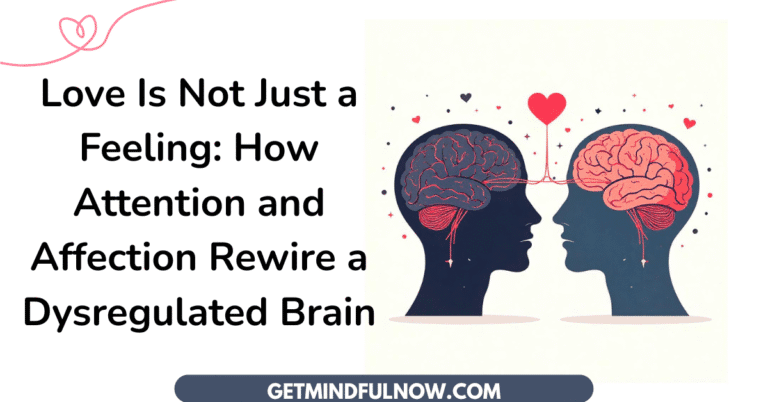When I first picked up A General Theory of Love, I didn’t expect it to put words to my own childhood. But it did, in a way no self-help book ever managed. Not with fluffy advice. But with cold, clear science.
Three psychiatrists, Thomas Lewis, Fari Amini, and Richard Lannon, wrote this book. Not poets. Not Instagram therapists. Doctors who studied the actual biology of love.
And what they revealed hit me like a slap and a hug at the same time:
Love isn’t just a feeling. It’s how human brains grow. Or don’t.
What Happens When a Child Doesn’t Get Love?
Let’s start here, because this is where my story cracked open.
I didn’t grow up in a warm, emotionally safe home. There were gaps. Huge ones. Gaps in affection. Gaps in safety. Gaps in attention.
I lived in those gaps for years. On the outside, it didn’t always look like trauma. But inside? My system was dysregulated. I didn’t know how to trust, feel safe, or even calm down after stress. I just knew something was always… off.
Then I read A General Theory of Love, and I found the science that explained exactly why:
When a parent doesn’t give emotional warmth, the child’s limbic brain doesn’t wire correctly.
Let’s break that down.
Limbic Brain 101: The Emotional Core
We have a part of our brain called the limbic system. It’s responsible for emotion, connection, safety, fear, bonding, all the deep, mammal stuff.
And here’s the key part:
The limbic system doesn’t develop in isolation. It wires itself by being in close contact with another well-functioning limbic system — like a parent’s.
This is what the authors call limbic resonance.
It’s when one nervous system tunes itself to another, like two instruments finding harmony. A baby feels mom’s calmness. The baby’s brain copies that calmness.
If the parent is attuned, emotionally present, responsive, safe, the child’s brain gets the signal: you’re safe now. The stress circuits cool. The emotion circuits learn balance.
That’s how emotional regulation develops.
Not from words.
From closeness.
From presence.
From love.
When That Doesn’t Happen…
…the child grows up feeling unsafe inside their own body.
This is called limbic dysregulation. It’s the core of anxiety, unstable mood, hypervigilance, or numbness. And for many of us, it’s not something that came later in life. It’s something that was never wired right to begin with.
And that’s the part that finally made sense to me.
I wasn’t broken. I was unwired.
Love Heals — Through Limbic Revision
But the book doesn’t just explain how love shapes the brain.
It explains something even more powerful:
The brain can be rewired — even in adulthood — if it comes into sustained, safe emotional contact with another person.
This is called limbic revision.
It’s when your emotional brain changes its wiring because of a close, loving relationship.
Not in one moment. But over time. Slowly. Through small, repeated signals of safety, affection, and presence.
Let’s say you’re always anxious after conflict because your father withdrew during fights. Your body learned that conflict = emotional abandonment. But if your current partner holds space for you during conflict, stays, doesn’t leave, your limbic system starts to learn a new truth: maybe I won’t be left this time.
That’s limbic revision.
It’s not healing through advice. It’s healing through being loved differently than you were before.
So Is It Nature’s Fault We’re So Damaged?
That question has haunted me.
A child is born with 50% of each parent’s brain blueprint, emotional wiring, tendencies, even trauma responses.
If both parents carry unresolved pain, avoidant habits, emotional flatness, anxiety, that’s what the child gets. Not just genetically, but environmentally too.
So is that it?
Are we doomed before we even begin?
The science says no.
Because even if your brain came wired for chaos, it can still be rewired through love.
The limbic system does not finish growing at birth. It grows through relationships.
Which means…
Even if you were born with inherited pain…
Even if you never felt truly safe growing up…
The right kind of love can still rewire your brain.
That’s not poetry. That’s science.
Attention and Affection Are Medicine
Here’s the truth: this isn’t just about parent-child dynamics. Any emotionally close bond can offer healing:
- A friend who holds your mess with calm
- A therapist who sits with your storm instead of fixing you
- A partner who doesn’t shut down when you cry
- Even a mentor, a spiritual teacher, or a community that stays with you
They all send one core message:
You are not too much. You are safe with me.
And that’s when your limbic brain exhales.
That’s when neurons rewire.
That’s when your emotional world starts to feel less like war and more like home.
If Parents Got It Right, So Much Pain Wouldn’t Exist
Here’s what really struck me after reading the book:
If just one parent — one — knew how to attune, to stay, to hold space, to connect with their child consistently… the child wouldn’t have to spend decades healing in adulthood.
That’s the truth.
So many adults walking around lost, anxious, angry, shut-down, are just children who never got limbic regulation in the first place.
If mom gave her full emotional presence without dismissing your pain…
If dad wasn’t avoidant, wasn’t cold, wasn’t distracted, but actually attuned and present…
So many of us wouldn’t be searching for healing at 30, 40, 50.
That’s the hard truth that this book pulled out of me. I didn’t just learn what love could be. I saw exactly what I missed, and how deeply it shaped my life.
But Here’s the Beautiful Twist
You’re not stuck.
The damage wasn’t your fault. And the repair doesn’t have to be your burden alone.
Because love, the right kind, is still possible. From friends. From mentors. From good partners. And yes, MOST IMPORTANTLY from yourself.
And that love? It literally reshapes your brain.
That is the miracle of being human. We can be changed. Not by lectures. But by love.








